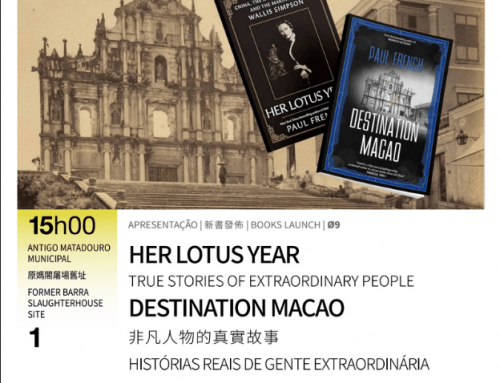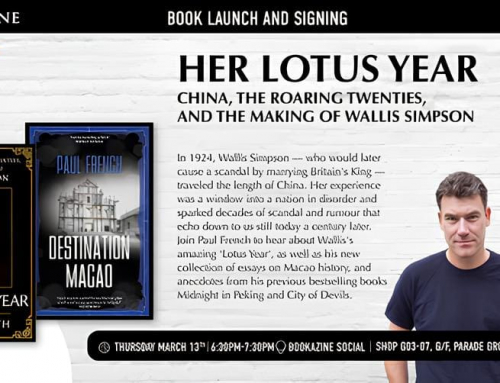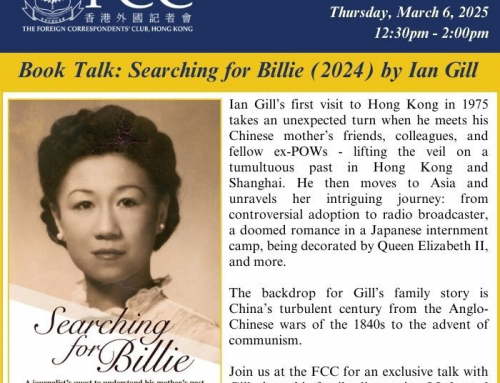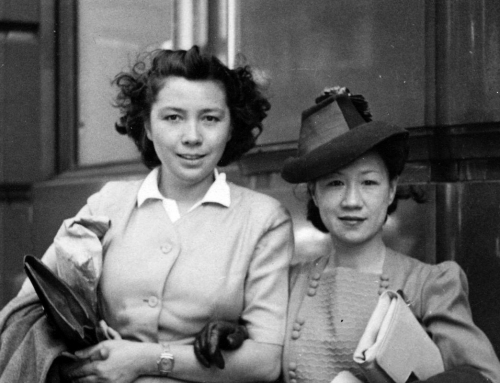 Stephen Greer’s new Asia business memoir Starting from Scrap has just been reviewed in the Wall Street Journal.
Stephen Greer’s new Asia business memoir Starting from Scrap has just been reviewed in the Wall Street Journal.
Greer arrived in Hong Kong in 1993, a recent college grad with no financing, scant experience, and only a notion of starting some kind of business. Fourteen years later, his company Hartwell Pacific was a $250-million enterprise and a player in the global scrap-metal recycling trade. Along the way he encountered cultural roadblocks, ruthless and sometimes unscrupulous competitors, and learned critical lessons in what makes a young business thrive. His remarkable rags-to-riches story is chronicled with humour, suspense, and keen insights into Asian business.
Here’s an excerpt from Starting from Scrap.
Chapter 3: Hartwell Pacific is born
After the predawn epiphany in my bedroom at No. 8 Robinson Road, I got down to work. What’s the first thing you should do if you are going to start a business: Develop a concept? Write a plan? Analyze your resources? Understand the needs of your customer? Don’t be silly. Incorporate. For most people, incorporating a company is a clerical task, but for me it was monumental. In coat and tie, I marched down to the offices of McDonald and Murray, an accountancy that specialized in incorporations. Its formal conference room with thick carpeting, a walnut table, and walls lined with prints of nineteenth-century sailing ships was suitable for this great moment. Despite the upscale decor, the partner who helped me was disheveled and appeared utterly exhausted.
He explained through a thick Irish brogue, which had me guessing at times, the positives and negatives of Liberian, Tongan, British Virgin Island, Cayman, and Hong Kong companies. “With British Virgin Island companies there are no required audits,” he enthused.
I imagined board meetings in the Caribbean under palm trees. I was disappointed to learn that you never actually had to go to the Virgin Islands. In the end, I opted for a plain vanilla Hong Kong company.
It was with great pride that I incorporated Hartwell Pacific on May 21, 1993. I used Hartwell, my middle name, so that people couldn’t guess that I was a one-man band. I was so proud of that incorporation certificate. It meant more to me than my university degree, when in fact all I’d done was spend a couple thousand dollars on a nice little piece of paper. The registered office and mailing address were in a business center/shared office in the prestigious Prince’s Building, not far from Morgan Stanley.
Hartwell Pacific’s incorporation and registration process was incredibly easy, taking only a couple of days. There aren’t many places in the world as efficient as Hong Kong. I then went down to HSBC (Hong Kong & Shanghai Banking Corporation) to open an account.
“I am here to open a corporate account,” I announced.
“Very good. May I see your reference?” the girl behind the counter asked demurely.
“Reference? I don’t have a reference. I’m here to give you money and business, not take a loan!” I shot back, blood rushing to my face.
“Unfortunately, you need to have a reference from someone who has a corporate account here,” she apologized.
“Then I’ll take my business elsewhere!” I finished, storming past the other customers waiting in line. I limped next door to another, smaller bank, which accepted my $500 and issued me a checkbook in the name of Hartwell Pacific. I assured the clerk, who couldn’t have cared less, that there would be much larger deposits in the near future.
With checkbook in hand and officially incorporated, I was ready to begin my journey as an entrepreneur.
Next, I bought a phone/fax machine for my home office and signed up for a pager.
Communication is key! I thought.
A mobile phone in those days would’ve been a lavish expenditure, and they were the size of a brick. I instead chose New World Telecom’s pager service because it was noted for reliability, and more importantly the salesgirl Maggie was a knockout.
Let’s see: corporate setup, prestigious office address, bank accounts, communications, dinner with Maggie on Tuesday. What now? Yes: business planning!
I assumed I would start by trading a product or commodity, versus manufacturing or building something, but held a longer-term view that pretty much anything that had worked well in the West could be done in the fast-developing Far East. There was endless opportunity without having to invent a thing, and I was definitely not the mad scientist type. I would focus on the motto of the H. J. Heinz Company, where my father worked for thirty-seven years. It was featured on many walls around the company’s offices and in his den at home.
TO DO A COMMON THING UNCOMMONLY WELL, BRINGS SUCCESS.
I sent off a fax (no e-mail back then) to almost everyone I’d ever met of business significance. It went something like this:
Dear Sir,
I am writing to inform you that I have established Hartwell Pacific Limited as a trading company in Hong Kong. We are looking to participate in trade between China and
Please do not hesitate to contact us.
Sincerely,
Stephen H. Greer
President
I figured that was broad enough to have me pretty well covered.
My first stab was in what’s known as the gray market. When the price of, say, Pringles or Duracell batteries is relatively low in one market, such as Florida, due to overstock, and the price is high in Hong Kong or Moscow due to company pricing policy, gray marketers try to get their hands on the goods in Florida and sell them in Hong Kong, locking in the price gap. I called it “Consumer Product Arbitrage”, which had a more sophisticated Wall Street sound to it. This “arbitrage” infuriates the corporates, as they want to dictate where they sell and at what price. I uncovered an opportunity exporting Levi’s blue jeans from America to Hong Kong. Utilizing a courier flight, a cheap way to fly if you are willing to carry a mail pouch, I went to the States and closed on a couple of shipments from JCPenney, but ultimately I found Levi’s restrictions on the number of jeans you could buy in any one transaction overly burdensome. I also discovered that after adding in all the transportation and distribution costs—not to mention the discounts required by the Hong Kong buyers to make the deal work—the net margin wasn’t so attractive. It wasn’t meant to be. I kept moving.
In the hunt for a viable model, I encountered a wacky array of businesses and learned over time that there is someone out there making a buck off just about anything you can think of. At one party I encountered Daryl Patton, the chicken-foot king. That’s right, chicken feet. Steamed or braised, they are a delicacy in China. Daryl was head of Asian operations for the largest trader of poultry parts in the world. Clearly this was a niche business, but he explained that they were moving two hundred ocean containers per month, valued at over $500 million per year. We throw that shit away at home and these guys have built a $500 million business out of collecting it and shipping it to China!
I was curious as always and grilled him about the business over bottomless glasses of beer as a scantily clad Filipina girl twirled around a brass pole on the stage ahead. Most people in the club had something else on their mind, but I was focused on commerce.
“How do you control quality? How are prices determined? What markets do you buy from? How does the supply chain work?”
The obvious response would have been “It’s none of your business and I’m trying to enjoy the show,” but Daryl was generous and explained the ins and outs of chicken-foot trading. His employer had created a processing machine that fit on the end of a typical poultry production line. It collected all the feet and in a sanitary fashion removed the nails and other parts that people in China did not consider desirable. They then froze the feet, packed them up, loaded them into refrigerated ocean containers, and shipped them off to China. They had processing lines at most of the major poultry plants in America and also in Brazil, which Daryl explained is a big poultry market.
Convinced I understood the basics, I jumped right on it and through a hot tip learned that New Zealand had a sizable plant. Thanks to persistent calling, I discovered that they discarded their chicken feet as waste. Unfortunately, the business was not to be: The plant slaughtered only about one hundred thousand chickens per week, while a major plant in America would process well over a million. Thus, it did not represent enough scale to justify the investment in processing equipment. My dreams of becoming the Frank Perdue of Asia went up in smoke, which was just as well. I can’t imagine sitting around a conference room discussing ways to kill ’em faster.
In the desperate search for crap to trade, I met a girl named Ivis. It was meant to be Iris, but in her prior job they gave her business cards with IVIS on them and suddenly all her customers knew her by the misspelled version. It’s humorous how many unusual “English” first names you come across in Hong Kong—Nigerly, say, or Romson. I even met a prominent businessman named Frankl. Curiously, as I type this sentence, I notice that the L key is right next to the K, so I assume Frankl’s secretary had a twitchy right hand.
Ivis worked for a small Hong Kong metals trading company called Tin Wah Metals, which sought to procure steel for China. The state of Virginia, for which a friend of mine, Nick Peterson, worked, received an inquiry from Ivis regarding construction steel. Nick passed it to me and I chased it down, eager to find a deal.
Through research at the Hong Kong Trade Development Council, I was able to find the type of steel Tin Wah was looking for from a company called Russo Ferrous, which was shipping out of the former Soviet Union. Its Hong Kong office was on a high floor in Jardine House, the very headquarters of the Scottish company portrayed in Noble House, source of my earliest ideas about coming to Hong Kong. It is a fifty-story building in Central with round windows, giving the feeling of looking out of a ship’s portal—a nod to the nineteenth-century China clipper trade. The Chinese, making jest at this architectural anomaly, refer to it as “the house of a thousand assholes.” I was excited to be in this building, and imagined the taipan at his desk in a large formal suite on the top floor, pondering the future of China alongside old oil portraits of the former taipans. I entered Russo Ferrous’s offices a few floors below, and was escorted into a plainly decorated conference room—no art on the walls, no windows, just a simple laminated table. I thought, If you can afford this rent, you ought to be able to hang a couple of pictures on the wall. It all seemed very temporary.
I grabbed the nearest chair and a plainly dressed Chinese lady served some tea, bowing slightly as she placed a paper cup in front of me. A few moments later my counterparts for this negotiation, Vladimir and Sasha, entered. They were an odd couple with long hair tied in ponytails; Vladimir had a straggly beard reaching down to his chest. In my mind, these guys were textbook stereotypes of Old World Russians. They had rich accents, slowly rolling their r’s and finishing their sentences just the way Count Dracula might have. They got out a large map, unfolded it onto the conference table, and pointed out the small Far East Russian port of Holmsk on the Sakhalin Islands whence the steel would be shipped. I loved it. Bond. James Bond. Or perhaps Greer. Stephen Greer, I mused. As discussions continued over the ensuing weeks, we would meet in bars to enjoy shots of vodka and let our hair down, both figuratively and literally, while we discussed the possibility of developing trade.
Having found a source of steel, I convinced Ivis that Hartwell was an important trading house specializing in metals. After all, I was from Pittsburgh, the onetime steel capital of the world and former power base of Andrew Carnegie. Whenever potential trade partners would ask how I got into the metals business, I’d reply, “Well, you know, I am from Pittsburgh.” They’d nod with understanding.
Ivis persuaded me that her boss had strong connections in China and financial power, so payment wouldn’t be a problem. Her confidence was very convincing. We negotiated hard back and forth, and once we had a basic framework for a deal—prices, volume, delivery dates, and payment terms—Ivis suggested we meet in person.
“Why don’t I stop by your offices this afternoon?” she requested.
Panic set in: My apartment on Robinson Road was clearly not an acceptable office. I would have to rent a conference room at the business center, and I wasn’t sure I could arrange it in time.
“Better idea. Let’s have lunch. I know a great Chinese restaurant,” I countered, thinking fast.
We agreed to meet at Zen, a stylish Cantonese restaurant near Central. I arrived early and took a seat facing the entrance. After a few minutes, right on time, the host escorted a petite Chinese girl toward my table. She walked purposefully in high heels, wearing a pin-striped suit, with long dark hair pulled back off her face and gold-rimmed glasses perched on her nose. She held a folio with papers in her arm and a black leather purse over her shoulder. She looked professional, confident, and also attractive. Keeping focused on business, I stood to greet her. I’d matched her conservativeness, wearing a dark suit, black wingtipped shoes, a white shirt, and a tie, my hair neatly groomed as usual.
“You don’t look nearly as tough as I’d expected,” I opened with a wry smile.
Though her restrained dress and calm demeanor were clearly an attempt to seem mature and serious, her baby face gave her away. I guessed she wasn’t much older than twenty. I’m sure this feeling of surprise was mutual, but she put her hand forward and said simply, “Nice to meet you.”
She either didn’t catch my humor or chose to ignore it. Better keep this straightforward, I thought, bowing my head slightly as I took her hand with a gentle grip. Let the negotiating begin.
She fired the first shot as we perused the menu.
“How do we know that the quality will be right? Which mill is the producer?” Her dark eyes flashed as she stared me down from across the table.
Recoiling from the barrage, I tried to allay her fears and mount an attack of my own.
“Not to worry. We have a great deal of experience with this company and they’ve shipped well over a million tons of steel to China in the past year,” I said, quickly reciting information gleaned from Russo Ferrous’s brochure. “Of course I can’t reveal my source, but you will have third-party inspection certificates for the cargo. Let’s talk about the letter of credit. Will it be opened from a prime bank in Hong Kong?” I inquired, shifting the conversation to her responsibilities and away from my own.
I enjoyed the banter with Ivis. It was exciting to be working on a live deal. I also felt that behind her strong exterior was a softer side. It was in the eyes. There was great warmth once she settled down and relaxed. This is someone I can work with, I thought.
The conversation continued in this vein, as we played Ping-Pong with the issues while snacking on tasty baskets of dim sum. This meeting was more about getting to know each other. The final details of the deal could be hashed out later.
We parted with another professional handshake and agreed to wrap things up as quickly as possible. I was impressed with her sharpness and clear command of the details, and was thinking that this was what Hartwell needed—someone who spoke Chinese to help me deal with Mainland China directly.
Though happy with my roommates on Robinson Road, things were getting busier now and I needed more space. Conveniently, I was invited to share an apartment at 37 Caine Road with two young American friends, Ed Silver and Nick Peterson. Ed was a Stanford grad originally from Boston who worked in consulting; Nick, a Harvard grad from LA, the guy who’d fed me the trade lead introducing Ivis. Though it was in an ugly, run-down building, one block farther down the hill from the Peak, this apartment was a great step forward for Hartwell Pacific. The rent was about the same, but I would now have more space. It had three bedrooms and a wooden box on the roof with a bed in it. The deal was that we’d split the rent three ways and I’d get the smallest bedroom plus the wooden box. I used the smaller, third bedroom as an office and slept in the box, which my friends referred to as “the coffin.” I couldn’t stand upright in this illegal structure. It was literally perched on the roof, so I had to exit the apartment and climb the common stairs to get to bed. At night, I could hear rats walking around on the ceiling, tripping over old furniture and a chandelier that our landlord stored up there.
I’m not sure this rooftop dwelling was entirely safe. One night I awoke to an electrifying jolt and was frozen for a few seconds, unable to move. There was thunder around, so I was pretty sure we’d taken a lightning strike. Friends were amazed that I slept in the coffin and even more amazed that I was able to coax a lady or two in there with me.
My favorite part of the apartment was the rooftop bougainvillea garden. To manage my stress, I nursed the plants along, watering them and tilling the soil. I was cognizant of the parallel between building a company and growing a garden. Over time it flourished into a high lattice of purples and pinks blocking out the ugly neighboring rooftops and hanging wildly over the edge of our building, visible from the street below.
Settled in, I could now focus on closing my deal with Ivis and Tin Wah Metals. The negotiations cruised along, haggling and arguing, and in a couple of weeks the deal was pretty much settled. It was fairly basic. Her company would open a letter of credit for around $3 million, and Vladimir and Sasha would prepare prompt shipment of the steel per the contract’s specifications, or so I hoped. It did dawn on me that I had very little control over the performance of any of this. As it turned out, my intuition was accurate. Ivis’s buyer couldn’t come up with the money. I also learned through a connection at the US consulate that Russo Ferrous was being monitored by the CIA for flouting the UN trade embargo on Serbia. We were obviously working very hard on a deal that would most likely never happen—and if it did could land me in a heap of trouble.
Realizing that we were not going to get any business done, but respecting her ability, I decided to persuade Ivis to join me as my partner. Just business for now. In fact, though I was a bit of a flirt, I felt strongly that I shouldn’t mix business and romance.
I came clean with her about the realities of Hartwell Pacific, its pedigree and business scope. She laughed, recalling how she’d called me on several occasions and heard dozens of people in the background taking phone calls and typing. With all the chatter, she’d figured it was a big office. She now understood that it had been a throng of telephone operators working for my paging service in a boiler room somewhere far from Central. Of course, the prestigious office address on my business card had also thrown her off. With her guard now down, Ivis explained that she, too, had thoughts of being an entrepreneur and felt what I was trying to do was both interesting and admirable. She revealed that she had no respect for her boss at Tin Wah Metals and that her plans for employment there were short-term. A perfect addition to my team of one, I thought, but first I’ll have to convince her.
A day or two later, Ivis agreed to come to my home office on Caine Road, Hartwell’s “world headquarters,” noting that she couldn’t stay long as she was meeting her boyfriend in a couple of hours. That’s probably good, I thought as I waited nervously for her to show up on the sidewalk in front of my apartment. I had other concerns. What would be her reaction to my home office? Would she lose interest in Hartwell Pacific? She arrived, again professionally dressed in a suit, but this time with a warmer and more relaxed smile.
“I hope you don’t mind a little exercise. It’s a sixth-floor walkup. Good for circulation,” I joked, offering up an enthusiastic handshake.
She smiled demurely. Crash! The metal security door slammed behind us as she followed me up the well-worn staircase. I paused on the fourth floor for her to catch her breath and wipe her forehead. She looked forlornly up the staircase, no doubt wondering whether she could deal with this part of her daily commute. Once inside the apartment and breathing normally, Ivis took a seat in a comfortable leather chair next to a leafy plant and seemed quite at ease with the surroundings. Narita, a part-time young Filipina helper, offered her a glass of water. Because Nick and Ed were at work, the apartment was quiet and spacious—a pleasant atmosphere. She didn’t seem bothered, or at least didn’t show it.
“Well, this is HQ until we can get some trades going, and then we can consider getting a proper office,” I started.
“That’s smart. You don’t want to have a high overhead until you get some business going,” she wisely confirmed.
My fears had been unwarranted. Ivis was also a young ambitious kid interested in giving it a go. She had been born in China and had immigrated to Hong Kong when she was eight years old. Her parents were divorced during the Cultural Revolution and she and her father were struggling, but this did not deter her appetite for risk or desire for success. Perhaps it fueled it. Though working to get her degree at night, she was ready to take the leap. She shrewdly pushed for a partnership rather than an employee relationship, even if it would be a minority stake. Eager to make progress with Hartwell, and grasping the synergy of this budding Sino–US partnership, I was confident that we could come to a mutually acceptable arrangement.
Read more about Starting from Scrap





Americans like to read this kind of from rags to riches story, even this individual did not do it in USA. Surprisingly this type of books got sold in major book store chains. I have seen that happened.
If your publisher still follow the British colonial style of management, You will not do well. If you follow the American business style of marketing and treat the world as your market you will do well. Many pre-1997 British mentality individuals will find life unbearable under the Five Star Flag after they lose their colonial privileges.
I think that’s in distant history, Frankie. Maybe until the 1970s that would have been the case. But I’ve been here since 1993 and I’ve had no privileges over others. We have to move with the times.